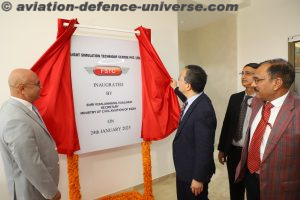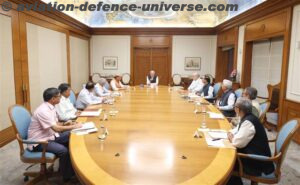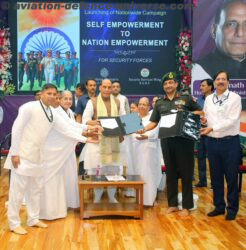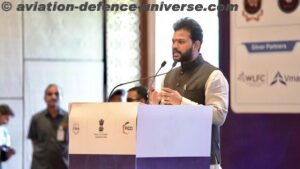- Parliament Aligns Aircraft Leasing with Global Standards
- Leasing Bill to Cut Costs & Expand Fleet
- Cape Town Convention Compliance Strengthened
By Sangeeta Saxena
New Delhi. 04 April 2025. The passage of the Protection of Interest in Aircraft Objects Bill, 2025 marks a transformative step in India’s aviation sector. Spearheaded by Civil Aviation Minister Ram Mohan Naidu, the bill aligns India’s aircraft leasing and financing ecosystem with global standards, strengthening investor confidence and reducing leasing costs. By addressing long-standing legal gaps, the legislation enhances India’s compliance with the Cape Town Convention of 2001, making the country a more attractive hub for aviation investments. This is yet another milestone under the current administration’s vision to fuel India’s aviation boom and expand connectivity.
The Protection of Interest in Aircraft Objects Bill, 2025, introduced by Minister of Civil Aviation Ram Mohan Naidu, was passed in Lok Sabha on 03.04.2025, following its earlier acceptance in the Rajya Sabha. With both Houses having cleared the legislation, this marks the second major aviation reform passed under the leadership of Civil Aviation Minister Ram Mohan Naidu. The bill aims to align India’s aircraft leasing and financing ecosystem with global standards and marks a critical step in deepening investor confidence in India’s rapidly growing aviation market.
The Minister underlined the urgency behind the legislation and stated “There was a vision behind this leap in civil aviation. There was a mission to fulfill that vision. And to make that mission possible, there was the guidance of our Prime Minister Narendra Modi. The kind of growth we are seeing today was made possible because of his leadership.”
Aiming to streamline and standardize worldwide leasing arrangements, the Bill builds on the foundation of the 2001 Cape Town Convention. Though India officially embraced this standard in 2008, deficiencies in legal enforcement resulted in higher lease prices—usually 8 to 10 percent more than other countries. This legislation would help India to close those holes, give aircraft financiers legal certainty, and lower expenses for Indian carriers.
He illustrated this growth with concrete figures. “For almost 65 years—from Independence to 2014—the total number of passengers flying annually in India was 10 crore 38 lakh. In just the next 10 years, that number has more than doubled to 22 crore 81 lakh in 2024,” he said. “Similarly, the number of airports in India increased from 74 in 2014 to 159 in 2024, with two more ready to be launched soon,” he highlighted.
The Minister also highlighted the rise in the number of planes, from 340 in 2014 to more than 840 by 2024. These numbers indicate that civil aviation in India is not just expanding but also thriving. No other nation has experienced this degree of aviation growth in such a short time frame, he said.
The Bill is anticipated to enhance the country’s compliance ratings under the Cape Town Convention, simplify leasing procedures even further, and make India a more appealing place for aviation investments. Reducing airline expenses and inspiring newcomers into the industry depend on these developments.
The conversation also covered more general civil aviation industry topics including the steep price of Aviation Turbine Fuel (ATF), which makes up around 45% of an airline’s running expenses. The Minister voiced worry about the state-by-state ATF tax disparity and urged additional states to follow the lead of those who have lowered their prices. He said, “Lowering these levies will cut passenger expenses and increase regional connectivity. Looking ahead, the Ministry of Civil Aviation has set lofty goals for capacity development and sustainability.
India is pushing hard toward cleaner aviation, aiming to produce 2.5 crore liters of Sustainable Aviation Fuel (SAF) by 2025 and convert more than 100 airports to renewable energy. Estimated at 30,000 to 34,000 over the next 10 to 15 years, the industry likewise struggles with increasing need for qualified pilots. “To satisfy this need, we are working on raising the number of Flight Training Organizations (FTOs) and granting more commercial pilot licenses yearly,” the Minister stated.
Ram Mohan Naidu affirmed the government’s long-term vision: “Civil aviation in India is not just about flying planes. It’s about connecting people, boosting economies, and creating opportunities. And we are committed to making India a global leader in aviation.”
With the passing of the Protection of Interest in Aircraft Objects Bill, 2025, India has taken a crucial step toward strengthening its aviation industry. By reducing leasing costs, enhancing investor confidence, and ensuring legal clarity, the bill sets the stage for sustained growth in the sector. Coupled with ambitious initiatives in sustainable aviation fuel, renewable energy adoption, and pilot training, India is on track to becoming a global leader in aviation. Minister Ram Mohan Naidu emphasized that the government remains committed to fostering connectivity, boosting economic growth, and creating new opportunities in the aviation landscape.





































































































































